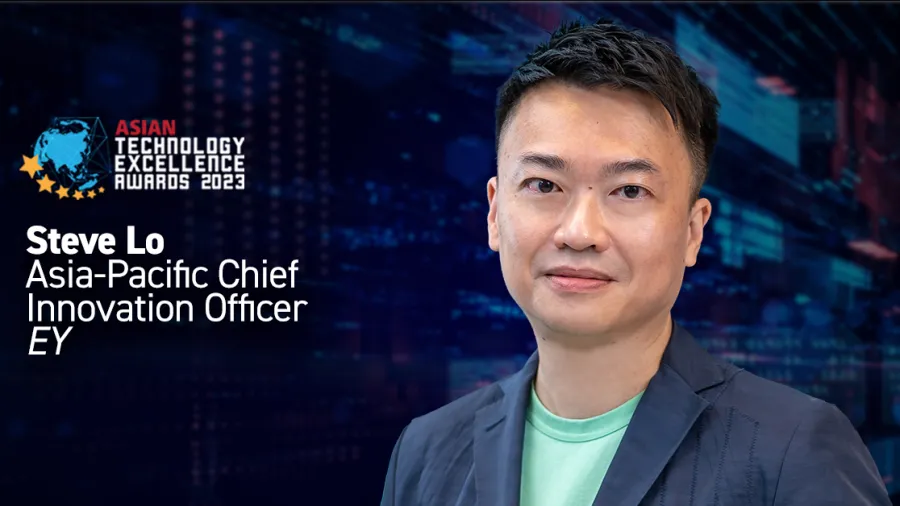
EY's Steve Lo delves into tech industry workforce reshuffling, ESG compliance, and emerging technologies
Lo emphasised the need for tech companies to adapt their hiring strategies, prioritise ESG compliance, and leverage emerging technologies effectively to drive growth and revenue.
Steve Lo is EY’s Asia-Pacific Chief Innovation Officer. He leads a team across EY Asia-Pacific to foster and drive innovation through ideation, incubation and adoption of disruptive technologies and business models that deliver sustainable transformational benefits to clients. Steve also leads the EY Asia-Pacific Innovation Tech Lab and is a member of the firm's Global Strategic Innovation Group which oversees and upholds innovation initiatives across EY globally. Lo has over two decades of professional service experience in business performance improvement.
With over two decades of experience advising global organisations primarily headquartered in Asia, recently in the innovation domain, Lo started his consulting career with a global tech consulting firm in Toronto upon obtaining his Engineering Master’s from the University of Toronto, and subsequently joined EY as a Partner in 2008.
With many tech companies rethinking their workforce strategy this year, Lo described the situation as a “correction” of the ‘hiring spree’ during the pandemic. He further acknowledged that there have been several developments in technology that have seen both benefits and downsides.
As a judge in the Asian Technology Excellence Awards, Lo emphasised the need to look at areas of greater impact to achieve ESG compliance and optimise business performance.
Amidst reports of a trend in hiring slowdown from tech giants this year, how do you think other tech companies can avoid this occurrence? What areas do they need to improve on or strengthen?
First, it’s important to put the hiring situation in perspective: quite a lot of tech companies overhired during the pandemic, as the normalisation of remote working made it more economical to recruit more talents without having to house them in extra office space. In a way, we’re looking at a hiring correction to what would otherwise be considered normal headcount levels in a rational market environment, when companies tend to run leaner, more cost-efficient teams anyway.
There’s also been a flurry of new, accelerated developments in areas like the metaverse and generative AI, which seem to have caused progress and chaos in equal measure. We see this especially with tech companies reconsidering their corporate strategy, as some have veered radically from the metaverse to AI only after having invested in talent resources in the former. What is important for employers is to stay agile with their hiring strategy and continue to find innovative ways of achieving higher productivity and efficiencies that can unlock sustainable competitive advantage in ever-changing market environments.
How can tech companies become better compliant with ESG and sustainability demands? What strategies or tools can they utilise?
Tech companies – and big ones in particular – have had an especially tricky time navigating the fast-evolving ESG requirements, largely because their profitability upsides are often so high but often achieved with a combination of abundant, globalised talent and technology resources to sustain their products and infrastructure. At present, very few tech companies have meaningfully figured out what their ESG strategy is, be it in reviewing the environmental impact and climate footprint of their supply chains or the ethicality of the way they operate their global businesses. Ultimately, companies must appreciate the fact, as proven by substantial and reputable research, that bottom-line performance is positively correlated to a company’s ESG maturity.
For a tech company to both achieve ESG compliance and optimise its business performance, it must take a sobering look at the areas of greatest impact—both commercial and social—that it can yield. For example, could there be ways of reducing power consumption and greenhouse gas emissions by investing in greener architecture? Instead of recruiting developers mostly on a remote basis out of cost considerations, could the company help boost the local talent market by hiring closer to home and creating more job opportunities for Gen Z or fresh graduate job seekers? To make a real sustainability-related impact, the company has got to place ethicality, integrity, and human interest front and centre of its corporate blueprint – and ensure that its execution isn’t done largely for cosmetic effect. When done right, the bottom-line results will naturally outweigh the initial investments and efforts.
What do you think is the importance of companies having a globalised agenda in today’s context? How can having this agenda drive growth and revenue?
Having a globalised strategy has been on the agenda of virtually every large multinational company over the past 3 decades. With more business operations and activities gradually moving online, the geographical porousness of the internet means that a globalised market is here to stay.
Companies must devise strategies to remain resilient in a now highly dynamic geopolitical environment, notwithstanding US-China political tensions, the rising cost of goods (e.g. oil as a result of the Russo-Ukrainian War), and growing rates of cybercrime. Companies can remain resilient by diversifying their resource allocation, conducting rigorous scenario planning, and partnering with local stakeholders and communities. By developing trust and goodwill, effective strategies can be developed to hedge against geopolitical risks.
What are some emerging technologies that are expected to make a huge impact in the markets in the coming years? How can organisations better utilise these strategies?
We’ve seen a couple of ‘hype waves’ around all sorts of ‘emerging tech’ over the past few years, all the way back from blockchain on the back of the crypto craze to the metaverse transforming consumer, industrial, and enterprise-level experiences. Now, we’re witnessing the explosion of generative AI products with unprecedented adoption rates. Quantum is also having a moment with some distinct, impactful use cases, although I suspect its market readiness may lag behind the others slightly. Depending on the time frame, all of these emerging technologies will make— if they aren’t already making—a substantial impact in the global market, and the reach will permeate all aspects of business, from foundational infrastructure (blockchain) and customer experience (metaverse) to job automation (AI) and corporate data risk (quantum). There’s a need for companies, then, to be focused on pursuing actionable steps with their tech strategy and to experiment with different scenarios whereby consumers purchase products and employees do their jobs in newfangled ways that may seem bizarre today. Ultimately, a good strategy is one that can make an impact on the ground. I suggest that businesses seek to build momentum with small, manageable experimentations of these emerging technologies and see those through until they see a measurable impact reflected in their operations.
What are your criteria for judging this year’s entries at the Asian Technology Excellence Awards?
The prescribed judging criteria by the organising body certainly aligns with what I’ll be looking for – ‘uniqueness & innovation’, ‘effectiveness & impact’, and ‘dynamism,’ which I suppose means agility & adaptability. These are all important traits in an excellent IT product. Obviously, the creativity of the idea will also be crucial – I’m going to want to be pleasantly surprised, and hopefully by concepts that we have yet to see in the market so far. Equally though, I think the feasibility of execution and market readiness of the product will also factor heavily in my evaluation because there’s only so much impact a creative idea can make if it can’t also achieve commercialisation.









![Cross Domain [Manu + SBR + ABF + ABR + FMCG + HBR + ]](https://cmg-qa.s3.ap-southeast-1.amazonaws.com/s3fs-public/styles/exclusive_featured_article/public/2025-01/earth-3537401_1920_4.jpg.webp?itok=WaRpTJwE)









 Advertise
Advertise


